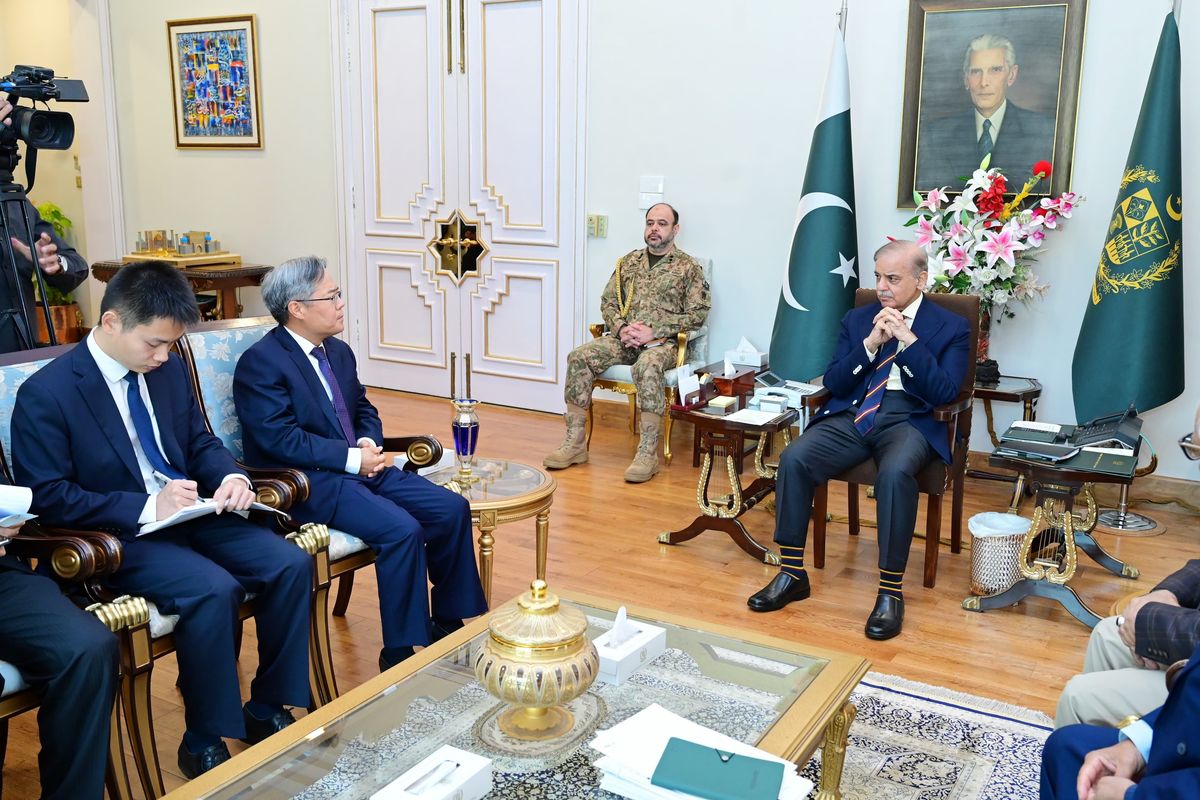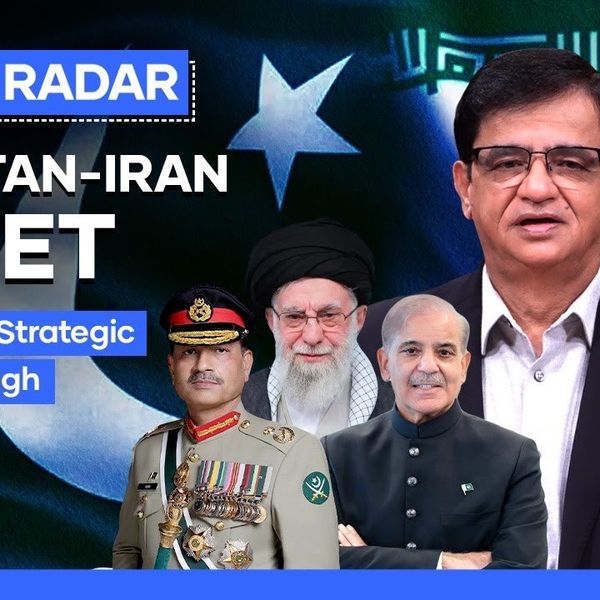Pakistan pushes for diplomacy as tensions over Kashmir attack escalate
Chinese and South Korean diplomats voice support for Pakistan’s call for peace and dialogue in South Asia

Javed Hussain
Correspondent
I have almost 20 years of experience in print, radio, and TV media. I started my career with "Daily Jang" after which I got the opportunity to work in FM 103, Radio Pakistan, News One, Ab Tak News, Dawn News TV, Dunya News, 92 News and regional channels Rohi TV, Apna Channel and Sach TV where I worked and gained experience in different areas of all three mediums. My journey from reporting to news anchor in these organisations was excellent. Now, I am working as a correspondent with Nukta in Islamabad, where I get the opportunity of in-depth journalism and storytelling while I am now covering parliamentary affairs, politics, and technology.

Ambassador Jiang Zaidong of China met with Prime Minister Shehbaz Sharif at the Prime Minister's House on May 1, 2025.
PMO
Chinese and South Korean diplomats have voiced support for Pakistan’s call for peace and dialogue in South Asia, as tensions flare with India following a deadly attack in Indian-administered Kashmir.
Ambassador Jiang Zaidong of China met with Prime Minister Shehbaz Sharif at the Prime Minister's House on Thursday. During the meeting, Shehbaz conveyed his good wishes to Chinese President Xi Jinping and Premier Li Qiang and thanked Beijing for its “strong and steadfast” support during the ongoing crisis.
The prime minister recalled a recent call between Chinese Foreign Minister Wang Yi and Pakistan’s Deputy Prime Minister and Foreign Minister Mohammad Ishaq Dar. He appreciated China’s understanding of Pakistan’s “principled position” on Indian actions and thanked Beijing for endorsing his proposal for a “credible, neutral and transparent international investigation” into the Pahalgam incident.
“Pakistan has always condemned terrorism in all its forms and manifestations,” Shehbaz said. He noted the country had lost more than 90,000 lives and suffered over USD 152 billion in economic losses in the global fight against terrorism.
He warned that India’s “belligerent actions” could hinder Pakistan’s counter-terrorism operations, particularly against groups such as ISKP, TTP, and BLA, which Islamabad claims operate from Afghanistan.
Shehbaz also criticized India’s move to “weaponize water,” saying it was a violation of the Indus Waters Treaty. “There is no provision for either party to unilaterally walk away from its commitments,” he said.
The prime minister stressed that resolving the Kashmir dispute was essential for lasting peace in South Asia.
Ambassador Jiang reaffirmed China’s support for Pakistan and said both nations shared a “common desire” for regional peace and stability.
Separately, Deputy Prime Minister Ishaq Dar spoke with South Korean Foreign Minister Cho Tae-yul to discuss the situation. Dar said India’s “baseless propaganda” and suspension of the Indus Waters Treaty had heightened tensions in the region.
Foreign Minister Cho expressed concern over the situation and emphasized resolving disputes through “dialogue and diplomacy.”
As non-permanent members of the United Nations Security Council, both officials pledged to strengthen multilateral cooperation. Cho also commended Pakistan for co-hosting the recent U.N. Peacekeeping Ministerial Preparatory Meeting in Islamabad.
They agreed to enhance bilateral ties through high-level exchanges in the near future.
Shehbaz-Rubio call
A day earlier, Pakistani premier also held a phone call with U.S. Secretary of State Marco Rubio to discuss rising tensions with India, according to an official statement from the Prime Minister’s Office.
Shehbaz urged the United States to press India to de-escalate tensions following the recent Pahalgam incident.
During the call, the prime minister shared Pakistan’s perspective on recent developments in South Asia, condemning terrorism in all forms.
He firmly rejected India’s attempt to link Pakistan to the Pahalgam incident and repeated his call for a “transparent, credible, and neutral investigation.” He called on the United States to urge India to “dial down the rhetoric and act responsibly.”
The prime minister also warned that any unilateral moves to alter commitments under the Indus Waters Treaty will endanger the lives of 240 million Pakistanis. He emphasized that the treaty provides no option for either side to back out unilaterally.
Shehbaz underscored the need for a peaceful resolution to the Jammu and Kashmir dispute, calling it essential for lasting peace in South Asia.
Earlier, U.S. President Donald Trump had sought to downplay the tensions and said that the dispute would get "figured out, one way or another".
Pahalgam incident
At least 24 people were killed in Indian-administered Kashmir when gunmen opened fire on tourists last week, with authorities calling it the worst attack on civilians in years.
Prime Minister Narendra Modi decried the "heinous act" in the summer retreat of Pahalgam, pledging that the attackers "will be brought to justice".
The attack targeted tourists in Pahalgam, which lies about 90 kilometers (55 miles) by road from the key city of Srinagar.
The killings come a day after Modi met with U.S. Vice President JD Vance, who is on a four-day tour of India.
Following the attack, India suspended the decades-old Indus Waters Treaty with Pakistan and gave Pakistani nationals 48 hours to leave the country.
Pakistan's response
Pakistan rejected India's baseless allegations and called for an independent and neutral investigation of the Pahalgam incident.
The Pakistani prime minister said on Saturday that Pakistan is prepared to cooperate in an impartial investigation into the Pahalgam incident, but warned that any attempt to undermine the country's sovereignty or cut off its water supply under the Indus Waters Treaty would be met with "full force".
He reiterated that while Pakistan desires peace, it should not be mistaken for weakness. He said the country’s armed forces are fully prepared to defend the country's security and sovereignty at all costs.
Deputy Prime Minister and Foreign Minister Ishaq Dar, during a joint press conference with the military’s chief spokesperson and the foreign office spokesperson on Wednesday, shared Pakistan's concern about growing tensions in the region.
“As we speak, the entire region is facing a serious threat to peace and stability,” Dar said in Islamabad. “This is due to the politically motivated and provocative environment being created by India in the wake of the Pahalgam attack.”
Dar added that Pakistan has nothing to do with the Pahalgam incident, “We demand an independent and transparent probe by neutral investigators, as already announced by Prime Minister Shehbaz Sharif”, he said.
Dar’s remarks came a day after Pakistan’s military accused India of sponsoring terrorism inside Pakistan.
Lt-Gen Ahmed Sharif Chaudhry, the chief spokesperson for the army, claimed India was directing a cross-border network of operatives. He said the military had “irrefutable evidence” linking Indian army officers to attacks in Pakistan.










Comments
See what people are discussing